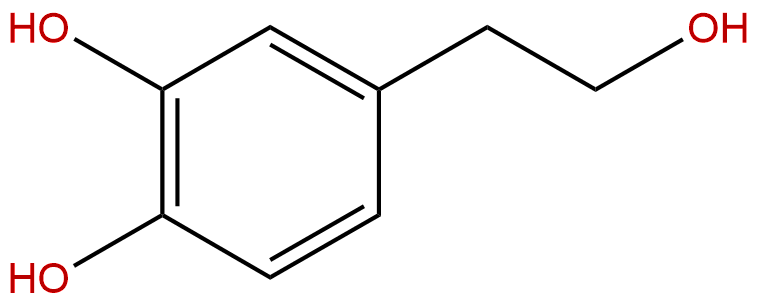
HydroxytyrosolCAS No.:10597-60-1
|
||||||||||
 |
|
|
||||||||

| Catalogue No.: | BP0746 |
| Formula: | C8H10O3 |
| Mol Weight: | 154.165 |
Synonym name: 3,4-dihydroxyphenylethanol; Dopaol
Catalogue No.: BP0746
Cas No.: 10597-60-1
Formula: C8H10O3
Mol Weight: 154.165
Botanical Source: Present in olives. Reported from Lian Qiao (Syringa spp.)
Purity: 95%~99%
Analysis Method: HPLC-DAD or/and HPLC-ELSD
Identification Method: Mass, NMR
Packing: Brown vial or HDPE plastic bottle
Can be supplied from milligrams to grams.
For Reference Standard and R&D, Not for Human Use Directly.
Inquire for bulk scale.
Description:
2-(3,4-Dihydroxyphenyl)ethanol has antioxidant properties; it is a potent specific inhibitor of lipoxygenase activities, it inhibits platelet 12-LO activity (IC50, 4.2 microM) and PMNL 5-LO activity (IC50, 13 microM) but not cyclooxygenase activity in cell-free conditions; it also inhibits 12-LO activity in intact platelets (IC50, 50 microM) and reduces leukotriene B4 production in intact PMNL stimulated by A23187 (IC50, 26 microM).
References:
Drug Chem Toxicol. 2014 Oct;37(4):420-6.Antioxidant role of hydroxytyrosol on oxidative stress in cadmium-intoxicated rats: different effect in spleen and testes.
Hydroxytyrosol (2-(3,4-Dihydroxyphenyl)ethanol, (DPE), a phenolic compound present in olive oil, is known to have antioxidant properties.
METHODS AND RESULTS:
The aim of this study was to investigate the effect of DPE on oxidative stress induced by cadmium injections (CdCl2 2.5 mg/kg body weight) in spleen and testes of adult male rats. Oxidative stress was evaluated by measuring lipid peroxidation by thiobarbituric acid reactive substances (TBARS) as well as superoxide dismutase (SOD) and catalase (CAT) activities in cytosol and mitochondria. We found that in spleen no TBARS formation was detected following CdCl2 injections; however, DPE induces decrease in TBARS level in treated and untreated rats. On the contrary, we observed that DPE showed no effect on cadmium-induced lipid peroxidation in testes. Cytosolic activities of SOD and CAT decreased significantly only in spleen, where DPE restores the values to the control levels. Noteworthy, mitochondrial activities of SOD and CAT were strongly reduced by cadmium treatment both in spleen and testes, and DPE was not be able to restore their activity.
CONCLUSIONS:
Overall, the results from this study indicated that the DPE has different antioxidant efficiency in spleen and testis of cadmium intoxicated rats.
HPLC of Hydroxytyrosol
